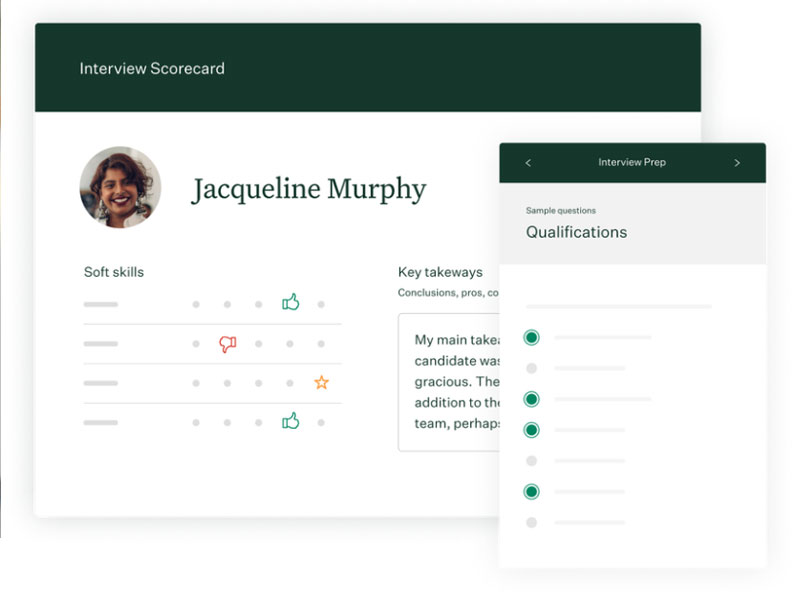One of the most important things a business can do is to make sure there is an excellent team in place. The success of your business depends on the strength of your employees. It stands to reason that recruitment and selecting new hires who will join your team is one of the most important business-building activities that you can invest in.
A key area in recruitment is the candidate experience you create. By focusing on how you treat candidates throughout the recruitment process, you increase your chances of finding and hiring an excellent employee.
Remember — recruitment is a two-way street. Just because you decide you want a candidate to join your company does not necessarily mean that they will want to join your company. It’s your job as the employer to convince job seekers that your company is an amazing place to work throughout the hiring process. One way you can do that is to provide an exceptionally positive candidate experience.

Get Your Basics Right
When it comes to creating a great candidate experience, you don’t need to get too advanced or fancy to create something special. I believe that the key is doing the basics really well. If you focus on the below key components, you will be far ahead of the competition when it comes to a great candidate experience.

Provide Regular, Timely Communication
Communication starts with how you word a job ad on your career site, all the way to the job offer letter. But it’s not just about the words you use. The quality of your candidate communication is also determined by uncertain silence.
Think about the last time you applied for a job. What was your experience like during the application process and after you submitted your application? Did you feel like you knew where you stood as a job applicant, or did you feel like your job application went into a void, never to be heard from again? The latter has all the making of a poor candidate experience.
Far too many companies do not prioritize regular, timely communication with candidates and job applicants. This is the simplest and most effective area upgrade for a better candidate experience. Any individual who applies to your company should receive effective communication from your company about their application.
What Does Good Candidate Communication Look Like?
Regular Updates are Essential
Any candidate who applies deserves an email from you. Either send a rejection letting them know you won’t be proceeding with their job application, or send an email to schedule the first step in your interview process.
Qualified candidates who progress through the hiring process deserve regular timely emails or phone calls about the status of their application. Touchpoints can look different depending on the stage of the interview process.
Individuals earlier in the process should receive emails letting them know if they are rejected or progressing forward. Individuals who are further along in the interview process have devoted significant time to the process and should receive a phone call if you are rejecting them. Regardless of the means of candidate communication, committing to regular, timely updates for all candidates in your hiring funnel is a clear way to differentiate yourself from other companies.
I recognize that this sounds simple, but you would be shocked by the number of companies that leave quality candidates in limbo, unaware of where they stand in a process. Limbo is the fastest way to erode your recruitment marketing by providing a bad candidate experience – this angst of not knowing where someone stands is poison to your employer brand.
A great rule of thumb is that no active candidate should go more than one business week without communication about where they are in the interview process. This means sharing clear next steps or “no update updates” with any candidate who is active in your hiring process.
What If There’s Nothing to Say?
Candidates who are “on hold” deserve regular communication too — use the “no update update” trick.
In an ideal world, we would always know the next messaging steps with the candidate (i.e. they are progressing forward in the interview process or we are rejecting them). The reality is that sometimes interview processes get complicated. I’ve often encountered situations where hiring managers wish to “hold” on candidates for all sorts of reasons.
While we always want to be communicative and clear with candidates, it is true that there might be situations where we simply don’t have a strong update on next steps. In this case, I am a big fan of sending a “no update update” to a candidate.
Silence can quickly turn a good candidate experience into a poor one. By committing to sharing regular candidate feedback, you show that you care about the candidate’s experience. Even if the update is “I don’t have an update on next steps yet, but I didn’t want to leave you wondering. I commit to following up with you again on X date.”

Provide Clear Information
Throughout the interview process, we must commit to providing clear information about what the interview process looks like. A simple way to do this is to develop written communication templates you will use again and again when you email candidates. This way, you are not reinventing the wheel every time you email candidate feedback, updates, or interview information.
For example, your interview process will remain fairly standard across roles (likely several stages that get more complex or involved as the qualified candidate progresses), so you can utilize templates that clearly lay out details like:
- How long an interview will last
- Who the candidate will meet with
- Details about where to go (for an in-person interview) or how to access the interview (if digital)
- Any expectations about dress code, etc.
Extra credit goes to companies that link to their website or share additional information about company goals or the team doing the interview. Just as hiring managers might brush up on tips for conducting interviews before getting them underway, any material that helps a candidate prepare for an interview will be appreciated. Respect the candidates’ time and peace of mind by making it simple and easy for them to know what’s expected of them.
Set Expectations About Timing and Process
Wherever you can, set expectations about timing and what the interview process will look like. These should be realistic – if metrics show it will take you a week to get back to the candidate after an interview, let them know that it will take a week.
Be clear and informative on what happens next, when you’ll be back in touch, and what the next steps will look like. Setting clear expectations and then meeting them is a great way to provide a positive experience and show a candidate that the company can uphold its obligations.
Provide a Consistent Company Contact for The Candidate
The crux of a great candidate experience is minimal uncertainty for the candidate and clear communication throughout the interview and hiring process.
Partial to this is that all candidates should know who at the company they can reach out to if they have any follow-up questions or concerns. Who this person is, and what touchpoints to use is something you can make clear in the candidate communication templates we talked about above.

Prepare the Interview Team
The sad truth about job interviews is that many interviewers go into the interview room completely unprepared to conduct an interview.
They often don’t know the specifics of the job they are interviewing for, they often haven’t looked at the job applicant’s resume before the interview, and they might not know what questions to ask in the interview. Naturally, this implies a disregard for the candidate’s time and creates a suboptimal first impression.
Practical Tips for Interview Preparation
One of the best ways a company can ensure a positive candidate experience is to invest in preparing the interview team prior to the interviews occurring. Here are some tips to make this a reality:
Communicate the Details in Advance
Send an email to your interview team when you open the role. Share information about the job including a link to the advertised post on your careers page or a copy of the job description. Talk about what the interview process will look like, and what you expect each interviewer to cover in their interview.
Make your expectations explicit - clearly communicate that you expect all interviewers to read a candidate’s resume prior to the interview.
Create Interview Questions for Each Stage of the Interview
The best interviews are structured and thoughtful about what questions will be asked.
When you provide clear questions for each interviewer to ask, you help ensure that:
- You are assessing all the necessary skills and traits needed for a role, and
- Your interviewers are providing a less-biased, more fair interview.
Provide Interview Training to All Interviewers
Companies that provide great candidate experiences ensure that their interviewers know how to conduct interviews. Simple training that goes through the dos and don’ts of interviews prepares interviewers on how to conduct a fair, thoughtful interview. This is one of the best ways to ensure a consistently better candidate experience.
The Benefits of a Positive Candidate Experience
Why is it important for businesses to invest in candidate experience? What’s the benefit?
In business, we always need to assess the return on investment (ROI) of any investment. Creating a great candidate experience has clear benefits and returns for an organization. Let’s look at them:
Potential Candidates That Stay in The Hiring Funnel Save You Money
Recruiting is expensive and time-consuming. Additionally, there is no guarantee that the candidate you select at the end of the process will want to join your company — which could put you back at square one and prolong your interview process. Never mind the loss of your best candidate.
Great candidate experiences that are structured and clear incentivize top talent to stay in your hiring funnel, and accept the eventual offer. Thereby, any effort you make for a better candidate experience is also making your recruitment efforts more effective. In short, a positive candidate experience can save you money.
Investing in regular communication will initially cost your company money. You need to devote time to setting up the job application process, drafting the communications, and committing time to execute the process. Ultimately, however, updates you make to your recruiting strategy for the sake of candidate communication pay dividends.
Candidates who receive this basic respect throughout the process are much more likely to join the company at the end of the process because they can imagine that this is a company that runs smoothly and values its people. In short, a good candidate experience implies a good employee experience to the job seeker.

You’ll Hire Better Talent Faster
A structured candidate experience is easier and more efficient to run than an unstructured experience.
What’s simpler? An interview and hiring process that has clear next steps and a process? Or one where the recruiter and hiring manager are constantly having to connect about what happens next? A clear, streamlined process will certainly benefit the candidate relationship, but it also makes it easier for your business to run the interview process efficiently. Once again, this added efficiency saves your business time and money.
A Great Candidate Experience Builds Your Employer Brand
When you invest in an experience that treats candidates with respect, you highlight your company as an employer that cares about people.
Even when you reject candidates in the interview process, their experience has been positive and fulfilling. Should they come across your company’s name on job boards again, they’d be more inclined to submit a second job application or recommend the job opportunity to a friend.
This is key to building a positive employer brand. It doesn’t take much to foster this great employer-candidate relationship. Clear communication, regular updates, and showing respect for the candidate’s time is the simplest and most effective way to support your recruitment marketing efforts. This means that, in the long run, you will have an easier time recruiting because you have a strong reputation (employer brand) amongst job seekers.
The flip side of this is when an applicant has a negative candidate experience and voices their dismay to friends, or on social media and employer review sites like Glassdoor. Any future efforts you make in terms of recruitment and talent acquisition can suffer serious harm from them simply conveying their experience. Candidates no longer accept poor treatment and are sure to look into past candidate experiences before answering any of your job postings.
Your Candidate Experience Conveys Your Values
A great candidate experience lets you live your company values. Ideally, all companies are operating with a perspective of what type of business they want to be and how they want to conduct their operations.
How you treat candidates is a great way to action your company values and be clear about who you are as a business. It’s a tangible way to live your values of how you treat people. In essence, there is a disconnect when your values are around prioritizing people and relationships, but you provide a poor candidate experience when people endeavor to work for you. In that sense, your candidate relationships are an extension of your values around employee relationships.
Determining Whether Your Candidate Experience Needs Work
The following red flags are clear indicators that you need to streamline your hiring process or otherwise solve for a better candidate experience.
Candidates are Regularly “Ghosting” You in the Interview Process
All companies experience some level of “ghosting” — when candidates simply don’t show up for interviews or don’t get back to you. However, if you are seeing a high degree of “ghosting,” it likely has something to do with your candidate experience.
Perhaps you are taking too long to get in touch with candidates (your communication is not timely). Or perhaps you are not clear about expectations. Ghosting is a good indicator to urgently look deeper into your candidate experience.
Candidates Regularly Reject Job Offers
There are all sorts of reasons why candidates might reject employment offers, and I want to be clear that it doesn’t always indicate a poor candidate experience.
However, if you regularly find yourself dealing with unaccepted offers, it’s a good idea to look back through your candidate experience. Are you treating people with respect throughout the hiring process? Could poor communication or disregard for their interview experience have put them off working at your company?
Candidates Pull Their Job Applications
As opposed to “ghosting”, candidates can notify you that they no longer want to be considered for the role. If strong candidates subtract their application midway through the hiring and interview process, it is worth asking why.
Perhaps you are not moving quickly enough or providing regular updates throughout the process.
Bear in mind job seekers might be in multiple hiring funnels at once, and pull out of yours to accept an offer elsewhere. This indicates that, while you don’t necessarily offer a poor candidate experience, someone else beat you to the best candidate in your talent pool. It might be time to streamline and get to sending an offer sooner.

Software to Improve Your Candidate Experience
You might be wondering what tools you can use to enhance your candidate experience.
An Applicant Tracking System (ATS)
One of the best choices you can make is to invest in the best ATS possible so that you can keep your recruitment process organized.
Check out this blog post on effective applicant tracking systems for great information about choosing an effective ATS.
Key features include
- The ability to communicate directly with candidates via Ad Hoc messaging and communication automation,
- Tracking of metrics like pass rates and time-to-fill so you can monitor the efficiency of your hiring process,
- The ability to create templates to send to candidates so you can scale your process, and
- The ability to structure interviews so you can keep your interviewers on point.

Interview Scheduling Software
You’ll want to make sure your ATS includes interviewing scheduling software. Greenhouse is a phenomenal example of a system that does all of the above and more!
Bonus points for greenhouse - it allows you to send out a candidate experience survey to candidates after their interview, which will provide you with great information about how you can continuously improve to offer a better candidate experience.
Differences Between Digital and In-person Candidate Experiences
It’s worth considering how your candidate experience will differ between hiring for a remote role vs an in-person role.
Ultimately, the themes of your candidate experience should be the same: clear communication, respect for the candidate, and timely updates. However, there are some key differences when it comes to logistics:
Remote Candidate Experience
Communicate Your Expectation Regarding Video Interviews
- Make sure you clearly differentiate between video calls vs. phone calls in communication prior to the candidate’s interview.
- The benefits of video interviewing are numerous, but getting a candidate to communicate clearly is sometimes difficult. Make it clear if you expect them to have their cameras on in a video interview.
- Do your best to troubleshoot any digital meeting links in advance of the interview. For example, offer the candidate the option to meet on an app they are already familiar with (Zoom and Google Meet are fairly common and easy to use).
Build in Warmth
An all-digital interview experience means that we lose out on some of the natural warmth that happens when we connect with people in person.
You can combat this by proactively building warmth into your digital interview experience. You can do this by making sure your email templates are kind, warm, and inviting. Additionally, make sure your interviewers bring friendliness to their digital interviews. A little small talk and a smile at the top of the interview go a long way to help someone feel connected.

Find Ways to Create Connection
The biggest challenge with an all-virtual candidate experience is that it can feel distant and disconnected.
Find ways to create a connection between the candidate and the company. Brushing up on some virtual interviewing tips for hiring managers is a good start, but this also might mean sharing collateral and materials that highlight company culture and what it’s like to work at the company. It can also involve building check-in phone calls with the candidate into the interview process.
What you’re working to avoid is getting to the offer stage and having the candidate feel that they don’t care very much about the company. If our ultimate goal is having a candidate accept the job offer, find ways to “make your case” throughout the interview process about why your company is such a great place to work.
In-person Candidate Experience
Provide a Warm Welcome
Make sure there is someone at the office to greet the candidate. It can feel lonely and isolating to arrive at an interview in an office and have no one greet you. The first few seconds after arrival is the candidate’s first impression of your company culture and can set the tone for a good or bad candidate experience.
Ensure that someone takes responsibility for meeting a candidate who is coming in person at the door. The energy we should bring when a candidate interviews in person is the energy we have when a guest visits our home. We should offer water or coffee, show them the office, and generally be friendly, accommodating, and kind. You wouldn’t let your guest wait in your living room alone while you do other things, and neither should your candidate. Be ready to interview job seekers on time when they arrive.

Don’t Be Vague About the Location
Be clear in your interview templates that the interview is in person. It seems obvious, but it’s not. In this hybrid world, it can be unclear if an interview will be via video call or in person. Make sure you are completely explicit about what the expectations are and how the interview will be conducted.
Bonus points for sharing clear directions on how to get to the office, where to park, and who will meet them at reception!
Get Them Excited About Your Office Environment
A true benefit to an in-person interview is that it is much easier to create a connection between the candidate and your company. Find ways to highlight the in-person benefits of working at your organization. Give them a tour of the office and have reading material by the front desk that highlights how great your company is.
At one company, we used to keep a “fun facts” book highlighting interesting details about our employees in the lobby. It was a great way for candidates to see that we cared about the people who worked there, and the amazing colleagues they would have if they worked there.
TL;DR
Investing in a strong candidate experience will impact your business far beyond your recruitment efforts. Yes, it will make it easier for you to hire the best talent. Yes, it will save your business time and money, because you will have a clear hiring process and an efficient recruitment strategy.
But the biggest benefit to investing in candidate experience is that it allows you to show your values to the wider world. Who are you as a company? How do you treat people? How do you prioritize empathy and kindness to others?
We show who we are through our actions. Take the action of being compassionate to all who enter your interview process. Be clear, be communicative, be conscious of a candidate’s time and comfort, and generate respect and kindness at every step in the hiring process.
This is how you build a business you can be proud of. And I guarantee you that people will want to work at a company that offers a great candidate experience and prioritizes its people, even before they work there.





















